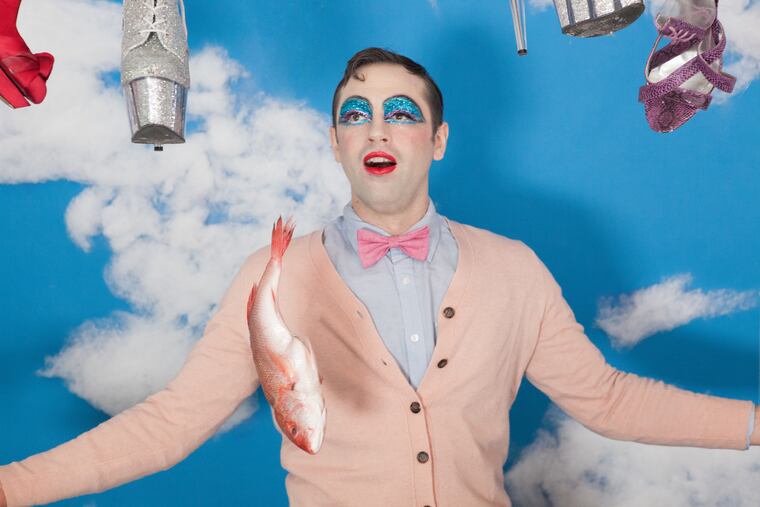Inspired by Mr. Rogers: Bearded Ladies’ latest queer cabaret promises it won’t mock Fred
The Bearded Ladies Cabaret production "You Can Never Go Down the Drain" is at the Wilma Theater June 20-July1.

Fred Rogers is having a moment. The creator of PBS's Mister Rogers' Neighborhood, who died in 2003, is the subject of the buzzed-about documentary Won't You Be My Neighbor?, the in-the-works biopic You Are My Friend starring Tom Hanks, and You Can Never Go Down the Drain, a new performance at the Wilma Theater. In the Wilma show, the Rogers-esque character is played by John Jarboe, one of the city's best-loved, boundary-pushing queer performers.
Jarboe is the artistic director of the Bearded Ladies Cabaret, a troupe known for its Bastille Day performances at Eastern State Penitentiary (the last of which will take place this summer). A year ago, Jarboe channeled circa 1966 Barbra Streisand in "Color Me Bearded," a pastiche of the icon's TV special Color Me Barbra. Like Streisand, a begowned (and bearded) Jarboe sang while wandering and posing in the Philadelphia Museum of Art. In 2015, the Bearded Ladies collaborated with Opera Philadelphia to premiere the Warhol-inspired ANDY: A Popera.
WATCH>>: A clip from the "Color Me Bearded" performance at the Art Museum
The Ladies' latest work transforms Jarboe into gender-ambiguous "Mx Rogers" in a modern, for-grown-ups-only attempt to figure out: What would Fred Rogers do, today?
Here, the artist holds forth on why Rogers, why now, and how Jarboe, a native of Montague, Mich., population 2,361, is working to make Philadelphia the global capital of cabaret.
First things first: Please say you're not mocking Mister Rogers.
I don't make fun of Fred Rogers, or even talk about who he is, his character, or his life.
I'm not putting words in Mister Rogers' mouth as a queer person nor as a drag persona. I'm going as Mx Rogers drag, wearing a queer drag version of Mister Rogers — which is my own, not meant to be him.
It's important to say this is a Mister Rogers-inspired show, with Mister Rogers-inspired music and tunes. Onstage with me is a jazz trio led by Heath Allen, the Bearded Ladies' music director.
If You Can Never Go Down the Drain isn't satire, what is it?
You Can Never Go Down the Drain is an exploration of earnestness and irony in 2018. Some of the questions we're asking are: If Mister Rogers were alive today, what would he say about the world, about how we're behaving as adults today, about the political situation?
It's really not about Mister Rogers at all. It's about how did we become adults? How did we start behaving so poorly? How can we start feeling the things we are feeling?
How did the project come about?
In 2016, I was at a queer party in NYC. I remember seeing performers there making fun of Midwestern people, and I thought: We do not need this right now. I'm from the Midwest — Montague, a little town in Michigan.
It got me thinking about earnestness and irony as political strategies. I realized that right now, everyone is searching for a voice that they can trust and follow, one that is immune to the corruption and the acidity of the current time. I found myself turning to Mister Rogers, watching his shows, singing his songs.
I workshopped the piece at La MaMa Experimental Theatre Club in New York, which just won a Tony for best regional theater, and we did a version of it at Joe's Pub [at the Public Theater]. The Wilma Theater will be the culmination of the development of the piece.
How did you make Philly your home?
I'm from Michigan, and went to college for English and acting. I came to Philadelphia thinking I would probably lily-pad to New York. I was in the regional theater circuit, where I did a lot of bad Shakespeare and a lot of bad musicals. But I didn't quite fit in and sort of stumbled into the cabaret form.
Cabaret is a form that wants my voice, that can handle my voice. Cabaret is queer. It's really alive, there's no fourth wall. It feels very present and now. Since I started Bearded Ladies, I've been using cabaret, along with opera and theater and performance art, to create these really live experiences.
In cabaret, you're being told a story — and someone's sitting on your lap. And if you take out your phone, we'll take it.
But Mister Rogers is so sass-free. How do you combine him with cabaret?
In the show, I give the audience bells. Whenever I become ironic or cynical or jaded, the audience has to ring the bells, and I go back to being earnest.
In all his shows, he's constantly advocating for allowing in our feelings. As he goes through hard subjects — divorce, death, bad feelings, bad wishes — he's talking about how feeling is different from action. He's so sophisticated in terms of how he's crafted these life lessons. And I just wish he were still around.
What's your next act?
Right now, I'm in the middle of rehearsing with 12 different cabaret artists from five different countries. This fall, we're opening Do You Want a Cookie, which is kind of like a haunted house of cabaret. We're taking over three floors of a warehouse on North 10th Street.
I want Philadelphia to become an international cabaret hub. Cabaret artists are the misfits' misfits, and we need a home. A lot of places are getting priced out, and Philadelphia is a great place to create subversive work.